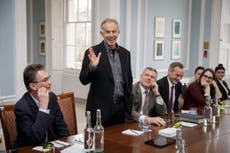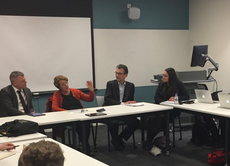Andrew Adonis: I have changed my mind about electoral reform
One of the architects of New Labour accepts that Tony Blair was right to ditch Roy Jenkins’s plan to change the voting system in 1998


Andrew Adonis came to talk to students on the “Blair Years” course at King’s College London the other day – I have only just had time to write about it because Tony Blair himself came to the class two days later (which I wrote about here and here).
Adonis gave a brilliant overview of the Blair government, focused mostly on what he saw as Blair’s failure to turn the Eurosceptic tide that led to Brexit, but what struck me most was Adonis’s confession that he had changed his mind on electoral reform.
The proportional system for European Parliament elections brought in by Labour in 1999 was “a huge mistake”, he said. “It created Ukip.” It provided a platform for Nigel Farage, who was one of three Ukip MEPs first elected then.
“I’ve changed my mind completely on electoral reform, from experience. I think it is very important in democracies that parties aggregate opinion, they don’t divide opinion. The only time we made that mistake in England was in Europe, but we made it fatally, because we created a proportional list system which allowed Farage to come in,” Adonis said.
This was surprising because Adonis is a great admirer of Roy Jenkins, the Labour home secretary and leader of the SDP who was charged by Blair with devising a more proportional voting system in 1998. “It could have been worse,” said Adonis, “because Roy wanted to change the whole of the UK’s electoral system, which would have been an utter, utter disaster.”
When I protested that Jenkins was his hero, he said: “No one is right on everything, and he was wrong on that.”
Adonis said that if Labour had stuck to the first past the post system for European Parliament elections, “there would have been no Farage”. He added that, if Farage had made it into the House of Commons, “people would have been exposed to him and seen what he was about”.
As it was, he said, Ukip were able to avoid scrutiny in Brussels and Strasbourg, but to have a base and resources for campaigning. Adonis said: “The great beauty of Westminster is that it is a goldfish bowl – people really do understand the strengths and weaknesses and frailties of people.”
As might be expected, Adonis, who has become a vehement campaigner against Brexit, sees much of the Blair government through the prism of the 2016 referendum. “As I look back on it, in retrospect, Blair was much more important to Brexit than we realise. What Tony did was to accept the entire Eurosceptic argument of the 1990s but not to advance it further,” he said. “Tony mitigated the effects of Thatcherism, and in a few areas such as devolution he reversed it, but on Europe, which now dominates politics, what he did was press the pause button and we’re still waiting to see whether the button remains pressed.”
Adonis was head of the Policy Unit in 10 Downing Street for most of Blair’s time as prime minister. In the last two years, he was schools minister in the House of Lords, setting up academies to replace under-performing schools in poor areas.
When he came to the class he was full of the arguments of his forthcoming book, Saving Britain: a Manifesto for a European Future, but he tried to stand back and offer a wider assessment of the Blair government in the long perspective of history:
“There’s very, very little that Tony did with the single exception of Iraq which progressives would think were in the wrong direction. The debate about it is whether he went far enough. And on Iraq, that wasn’t made in Britain. That wasn’t made by Blair. That was made by Bush, made in the United States, by the neo-cons. The debate about Tony was about how far he was right to ally himself with it.
“In historical perspective, he’ll always be somewhere in the middle rank at least of prime ministers, because there’s not much that he did that seriously set the country back, and the only debate is how far he took it forward.
“He is not in that category of prime ministers including Chamberlain, Eden, Callaghan and Cameron, who either brought government to a standstill and almost destroyed the authority of the state, which is what Callaghan did in the winter of discontent, or took steps that were catastrophic, in terms of the national interest and were largely self-commissioned, which I think was certainly the case with Eden and arguably the case with Chamberlain.”
But in the end, Adonis was brought back to Europe. Iraq was not on a par with Brexit, he said, “which was a massive self-inflicted wound, entirely created by Cameron himself.”
Other reports of “Blair Years” classes are filed here



Join our commenting forum
Join thought-provoking conversations, follow other Independent readers and see their replies